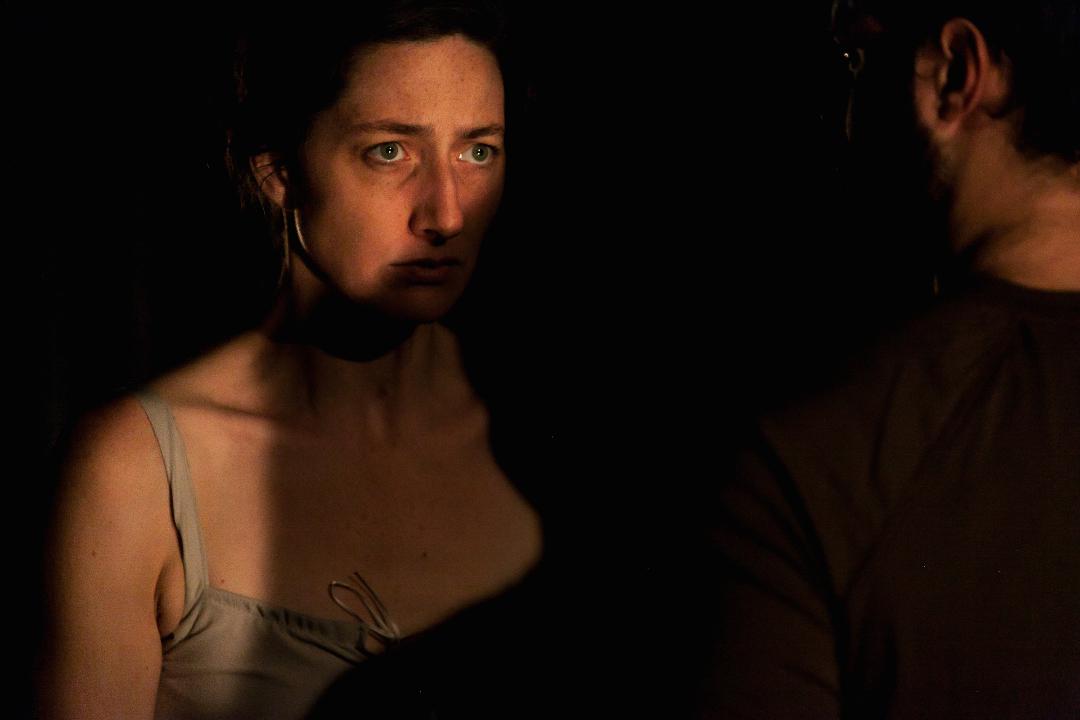
 [rating=3] This is a very exciting time for followers of Theatre Y and Red Tape. The two theatres have acquired a new location in Ravenswood (convenient to the Brown Line) as their permanent home, and are co-producing their inaugural production, Federico García Lorca’s Yerma, in a new adaptation by Hector Álvarez. But while the location is new, the play is recognizably a production directed by Red Tape artistic director, Max Truax, who is reunited with his frequent collaborator from Oracle Theatre, music director Nicholas Tonozzi. Lorca’s music-heavy “tragic poem” exists as a phantasmal image in the dark, a tale of a masochistic would-be mother’s loneliness and obsession in a society with twisted notions of sex and motherhood.
[rating=3] This is a very exciting time for followers of Theatre Y and Red Tape. The two theatres have acquired a new location in Ravenswood (convenient to the Brown Line) as their permanent home, and are co-producing their inaugural production, Federico García Lorca’s Yerma, in a new adaptation by Hector Álvarez. But while the location is new, the play is recognizably a production directed by Red Tape artistic director, Max Truax, who is reunited with his frequent collaborator from Oracle Theatre, music director Nicholas Tonozzi. Lorca’s music-heavy “tragic poem” exists as a phantasmal image in the dark, a tale of a masochistic would-be mother’s loneliness and obsession in a society with twisted notions of sex and motherhood.
Yerma takes place in the early twentieth-century Spanish countryside, where the titular character (Katie Stimpson) has been the wife of a shepherd, Juan (Cody W. Beyer), for two years. She wants a child very badly; he does not. Theirs was an arranged marriage, but they took to it because it was respectable (and Yerma, really, really wanted a son), and they do their duties. Early in the play, a pregnant friend of Yerma’s admits that she is afraid of the pain childbirth and children cause, but Yerma admonishes her that women who fear to sacrifice themselves are weak and selfish. Besides, she says, if women don’t have babies, their blood goes bad and they rot from the inside.
More years go by, and Yerma still has no baby. She stops behaving as respectably, and spends more time wandering the village and meeting with another shepherd, Victor (Brendan J. Mulhern). She becomes the subject of gossip, and the unsentimental Juan, who barely ever tolerated her, doesn’t like it. Honor and reputation are very important to him, and the couple is becoming more bitter. Yerma believes their emotional incompatibility is the reason they can’t have a child, and without that, a woman has no purpose in life. Everybody’s advice to her is to just stay inside and keep waiting.
While the conflict is mundane, Truax and set designer Joanna Iwanicka’s staging instantly lets the audience know this presentation is going to be focused on Yerma’s disastrous psychological deterioration. The audience’s chairs are in a large circle, and the whole floor is strewn with mulch. Taylor Ovca’s lighting design never reveals much at a time, but we do see the other townspeople are always present, looking in. Most of them are filthy; costume designer (and Theatre Y artistic director) Melissa Lorraine has the women in black-smeared dresses and the men shirtless and smeared with what looks like mud. Everything looks like it came from the fertility ritual which has a climactic role in the play save Yerma, whose dress is ghostly white and who often hovers above everyone else.
Stimpson’s acting conveys Yerma’s longing in a low-key manner that matches her will-o’-the-wisp appearance. Although Yerma spends a great deal of time shaming other women’s mothering, trying to chisel folk remedies out of elders, and debating with Juan, she has a spooky ethereal quality to everything she does. Part of that is thanks to Tonozzi’s music; the chorus has dynamic chanties they sing while whirling around the outside of the circle, but Yerma’s lullabies are calm moments of sadness. Stimpson maintains a sense of danger during that calm, though; Yerma is clearly unbalanced and it’s dreadful to think of what would happen if she ever did get to raise a son. (Juan suggests adopting at one point. Yerma angrily refuses because she can only love the product of her own viscera.) One of the biggest changes Truax and Álvarez make to Lorca’s script is changing some of the gossiping women into men, emphasizing social pressure on Yerma and Juan coming from a different direction. Theatregoers are probably more familiar with Lorca’s The House of Bernarda Alba, which similarly explored the psychological damage caused by oppressive familial attitudes and the violence that inevitably results. In Yerma, we have a much tighter focus, and with the gender change, we get a fuller picture how the danger in this kind of society works. We also see an ensemble that is remarkably in tune with each other, forming a complete little isolated world with Yerma at the center.
Yerma will continue at The Ready, 4546 N Western Ave, Chicago, thru December 10, with performances as follows:
Saturdays: 7:30 pm
Sundays: 4:00 pm
Tickets are $25 (discounts for students, seniors, and industry). For more information, visit Theatre-Y.com.
Running time is one hour and forty-five minutes with no intermission.
Parking options are plentiful.
To see what others are saying, visit www.theatreinchicago.com, go to Review Round-Up and click at “Yerma.”







More Stories
“Dummy in Diaspora”
“The Magic School Bus: Lost in the Solar System”
“February House” reviewed by Julia W. Rath